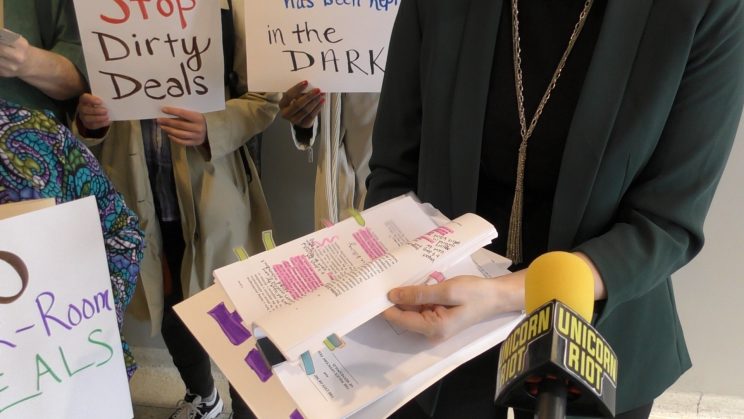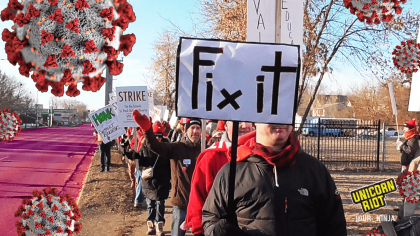Group Pushing For Better Police Contract Shut Out Of Public Meetings
Minneapolis, MN – A community coalition which recommended changes to a new contract between Minneapolis Police and the city are calling for contract transparency and an end to closed-door meetings.
As police conduct continues to be a hot-button topic, community members from MPLS For A Better Police Contract (MBPC) have shown an unprecedented level of involvement in the contract negotiation process. The group is a grassroots coalition of volunteers seeking to make “common sense changes” to better the contract.
After examining the lengthy draft of the current bargaining agreement, the coalition made 14 recommendations in October and attempted to sit in on the public meetings. Instead, community members found themselves shut out of contract bargaining sessions.
The coalition held a press conference on Tuesday, March 10, to give an update on their efforts. The presser was held outside the office of Laura Davis, Minneapolis’ Labor Relations manager, and was immediately followed by a firm request for a meeting with Davis, which was granted after some delay.
Unicorn Riot was live to document the event from Minneapolis’ Public Service Center.
In October 2019, MBPC provided the Minneapolis City Council their list of recommendations to improve the contract between the Minneapolis Police Federation and their employers, the city of Minneapolis.
The recommendations, which were well-received by the City Council, would “improve policing issues, decrease costs, and lead to better working conditions for the officers themselves,” said coalition member Michelle Gross. She is the founder and president of Communities United Against Police Brutality (CUAPB), a volunteer-run non-profit that pushes for police accountability and assists families and victims of police terror and brutality.
Coalition member Kim Milliard pointed out that whenever there’s a contract between the city and a public agency, members of the public are beneficiaries of such a contract, as well as “the ones who suffer the most from it” when things go wrong.
Milliard detailed the coalition’s top recommendations, which she called “demands” during the presser:
- Eliminate officer fatigue — cap of 50 hours per week. (Currently there are no limitations on the number of hours officers can work)
- Mandatory mental health screenings every three years. (Currently there is no provision for psychological testing in contract nor MPD policy manual)
- More flexible staffing — lower cap of ‘Bid Assignments’ from 70% to 50%. (This would provide MPD management with greater flexibility to assign officers where they’re needed based on their skill, experience, and conduct, rather than where the officers prefer to be assigned)
See the recommendations below.

As the negotiations started in October 2019, the coalition of community members attempted to make plans to attend meetings they thought would be open to the public, only to learn that the city and the police federation had used a clause in the process agreement to keep the public from observing the meetings.
During the presser, MBPC and CUAPB member Dave Bicking detailed the police federation’s process of exclusion and how he felt the city took steps to collaborate with the federation to prevent the coalition’s recommendations from becoming part of the contract.
“I sometimes picture a negotiating table with chairs on the same side. We fear it may be like that.” — Dave Bicking, MPLS For A Better Police Contract
Bicking said that after working on the contract for almost a year, the coalition planned to attend the bargaining meetings. They submitted data practice requests; one request was for meeting dates from the Labor Relations department, which MBPC says were answered months after the meetings had already taken place.
The coalition received the negotiation’s process agreements and saw that a provision allows for visitors who’ve been approved by both sides to sit in on the meetings. Bicking remarked, “it’s been made clear to us that we are not visitors who would be approved by probably either party.“
Bicking said that although the Open Meeting Law in Minnesota reads that negotiations can provide a reason for closing a meeting, “anything which has been brought to the table is public data.” Bicking said they’ve requested that data and have yet to receive it.
To further prevent the chance of public attendance, the Police Federation filed a request for mediation, ensuring the meetings would be closed to the public.
“We learned that there has been a request from members of the public to attend our negotiations,” wrote Minneapolis Police Federation attorney Jim Michels in a letter sent to Laura Davis on December 13, 2019. If Minneapolis Police hadn’t already wanted to file for mediation, hearing about the public attempting to attend the meetings would’ve pushed the federation to file anyways to “preserve the integrity of the process,” wrote Michels.
Bicking pointed out that the Bureau of Mediation Services (BMS) must fill out a form for any mediation request. The form asks for a party to specify why it is seeking mediation. The coalition saw an email the federation sent to BMS which didn’t include the form and stated that “although progress is being made on some issues, we want to go to mediation” with no further explanation.
In the emails obtained through data requests, the coalition observed zero pushback from the City of Minneapolis in shutting out the public from sitting in on the contract discussions.
Bicking said the coalition has shared Michels’ letter to BMS asking why BMS chose to allow mediation despite having not received the request through proper channels. He said so far they have received no response from BMS.
The coalition provided Unicorn Riot with copies of the letter and email correspondence from Michels to Davis, as well as the process agreements. See below.
MPD_Contract_Negotiations_Process_Agreement_2pages Michels_Emails_Letter_3pagesFollowing the noontime presser, the coalition stepped into the lobby of Human Resources, the site of Laura Davis’ office. After several minutes where the secretary and another staff member insisted that Davis “will not speak” to the public, Davis came out to greet the coalition.
She sat down for a brief talk with Michelle Gross who led a ten-minute discussion with Davis.
Laura Davis, #Minneapolis‘ collective bargaining manager, consented to speak with the members of the public about the negotiation & mediation sessions happening behind closed doors btwn the city and the @MinneapolisPD federation of #police.
We are #livehttps://t.co/VKVYi9mFr6
— Unicorn Riot (@UR_Ninja) March 10, 2020
Gross asked for the rest of the public data they had requested back in January, to which Davis replied she had already provided dates and times of meetings to the city clerk when asked. She admitted she didn’t know the status of the request as she isn’t the person who fills them out.
Davis said the federation and city are using ‘interest-based bargaining‘ to work with each other on issues, as opposed to passing proposals back and forth, and hence there is no data to fill that request.
Gross asked how the coalition can know whether any of their recommendations were being heard. Davis spoke highly of the recommendations, saying she has studied all of the proposals and “valued” having them. Some were already on Davis’ “list of issues.“
“They’re really excellent. They’re really clearly well-thought-out. We value having your proposals.” — Laura Davis, Labor Relations Manager, City of Minneapolis
Davis told the coalition she recognized how much time it took to go through a contract of such magnitude. Gross replied, “and we are all volunteers! No one paid us to do this, we simply want to have a better city.“
Gross asked for assurance that they would be able to view the full contract before it goes to City Council, and not just the executive summary, which has been the status quo in the past.
Bicking added that according to BMS, approving the executive summary “is not a substitute for approving the contract.” Davis said they’ve gotten approvals for many city contracts that were made through mediation with just an executive summary.
Bicking: “We’re saying this process has been done wrong, according to the Bureau of Mediation Services, for as long as we can remember.“
Davis: “Thank you for that. If that’s accurate, that’s news to me. I’ve been in this role for two and a half years; this is the way we’ve been doing it since I got here.“
Davis said she would check with the Bureau to make sure they are complying with the law and that it isn’t their intention “to do anything that does not comply fully with the law in all respects.“
After the impromptu meeting, the coalition gave a wrap-up of how they felt the meeting went.
Bicking said it is important to remember that a lot of the decisions for the contract have already been made. Bicking had cited specific law codes during MBPC’s meeting with Davis; he said that although he’s hopeful that future progress can be made, short of any lawsuits, past practices cannot be the excuse moving forward.
“It seems to me that the chief labor negotiator for the City of Minneapolis, who gets paid a lot more than I do, should probably know these laws better than I.” — Dave Bicking
Gross remarked that while she was glad Davis spoke to them and felt like they’d made some headway, she’s still concerned that the city is violating the law by keeping the public out.
“I think she’s still in the mindset that the public don’t belong in this arena, and we do.” — Michelle Gross
Milliard gave a limited amount of credit to Davis for speaking with them, saying “that’s just an expectation that we should be allowed to have.” She recalled that during the height of the Justice for Jamar Clark movement, community members gathered every Friday at the government center and sought a meeting with Hennepin County Attorney Mike Freeman. Freeman never once met with the community during any of the 22 ‘Freeman Fridays’ actions.
The coalition was hopeful that in the future, members of the community, who are public stakeholders in the contract, would be listened to directly and that the City Council won’t approve contracts that ties their own hands from allowing transparency.
“We are going to hold the city to the principles of an open government where public employee contracts are public information and the public can weigh in.” — Dave Bicking
The coalition continues to urge that the contract in its final form, not just the executive summary, be made available to the public before it is given the approval by the Minneapolis City Council.
As of now, according to the city, the contract is still in mediation.
Follow us on Twitter, Facebook, YouTube, Vimeo, Instagram, and Patreon.
Please consider a tax-deductible donation to help sustain our horizontally-organized, non-profit media organization:



